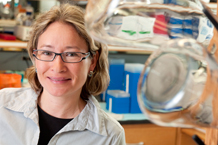Strengthening natural barriers to illness
The human body has a certain type of cell that lines the inside of all of its blood vessels. This vascular lining acts as a barrier to keep out things in the blood stream that could cause harm.
Increased permeability of this barrier in the lungs is associated with several life-threatening and all-too-common conditions, including acute lung injury, sepsis, lung inflammation, ventilator-induced lung injury and acute respiratory distress syndrome. One of the most serious results of the increased permeability is that it allows an influx of fluid from the blood into the lung's air spaces. This can lead to dangerous swelling in the lungs, as well as other problems.
New research funded by the National Institutes of Health National Heart, Lung and Blood Institute is aimed at studying whether enhancing the work and function of the natural barrier in the lining of the lung's blood vessels could be an effective way to reduce this swelling and to treat a variety of lung injuries, in particular acute respiratory distress syndrome. ARDS is a major cause of sickness and death with a crushing mortality rate between 30 percent and 40 percent in the United States.
"Since the molecular basis of acute lung injury is poorly understood, these studies will enhance our understanding of how the pulmonary vascular barrier functions," says Anna Birukova, MD, Associate Professor of Pulmonary and Critical Care in the Department of Medicine at the University of Chicago. "In addition, since no specific pharmacologic therapies are currently available for acute lung injury, these studies will be of potential therapeutic significance for treating this condition."
Team building
Among other things, the two-year $780,000 Recovery Act grant has created two full time research positions. In addition, it has already led to several published papers explaining new research results. It has also helped Birukova to establish herself as an independent scientist with her own research group.
Birukova's research is translational, which means that it is designed to apply basic — sometimes esoteric — research results to solving real world problems. "My scientific orientation has long been 'from bench to bedside,' so we expect this research to generate practical, useful knowledge that can be put to work improving people's health as soon as possible," she says.
By better understanding the molecular mechanism of lung pathologies, Birukova hopes to be able to find ways to use the body's own means and methods to fight disease. "My research interest is to explore natural mechanisms that help the body compensate for problems and/or to protect itself from illness," she says. "We believe that our studies may identify novel protein targets and propose new therapies for the prevention of pulmonary vascular barrier dysfunction associated with acute lung inflammation and injury."
by Greg Borzo
This award is funded under the American Recovery and Reinvestment Act of 2009, NIH Award number: 1R01HL089257-01A2. For more information on NIH's Recovery Act projects, visit http://recovery.nih.gov/.

A $780,000 NIH grant will enable UChicago investigator Anna Birukova, MD, to study how the pulmonary vascular barrier functions with the hope of treating a variety of lung injuries, in particular acute respiratory distress syndrome.
Photo by Lloyd DeGrane.










